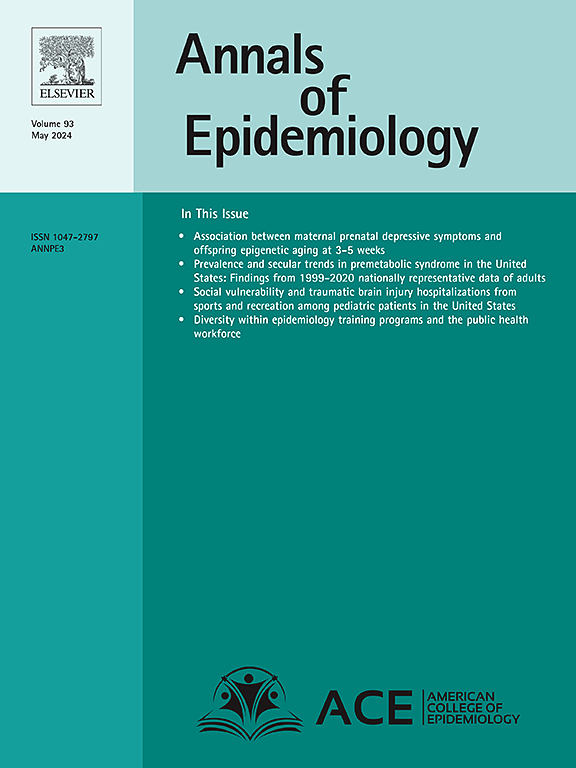COVID-19 vaccine acceptance differences among unvaccinated foreign- and united states-born persons: A cross-sectional study, 2021
IF 3.3
3区 医学
Q1 PUBLIC, ENVIRONMENTAL & OCCUPATIONAL HEALTH
引用次数: 0
Abstract
Purpose
To investigate the association between nativity and COVID-19 vaccine acceptance and its interaction with race/ethnicity, education, and English proficiency.
Methods
Differences in vaccine acceptance among propensity-score matched foreign- and US-born persons using 2021 California Health Interview Survey Data were measured using a survey-weighted multivariable logistic regression model with interaction terms and average predicted probabilities between nativity and: race/ethnicity, education, English proficiency.
Results
A total of 4,234,655 survey-weighted persons (8504 unweighted) met inclusion criteria; 2251,279 (53 %) were foreign-born (1,983,376 US-born), and 55 % of all persons were Hispanic/Latino, 22 % were Non-Hispanic White, 17 % were Non-Hispanic Asian/Pacific Islander, 3.6 % were Non-Hispanic Black/African American, and 2.5 % were categorized as ‘Other’. Foreign-born status was significantly associated with greater odds of acceptance (adjusted odds ratio [aOR], 2.81 [95 %CI, 1.16–6.83]). Foreign-born Hispanic persons had a significantly greater probability of acceptance compared to their US-born counterparts (average probability difference, +0.11 [95 %CI, +0.023, +0.20]). Foreign-born persons with poor English proficiency had a lower probability of acceptance versus US-born persons (APD, −0.081, [95 %CI, −0.43, 0.27]).
Conclusions
Nativity was significantly associated with COVID-19 vaccine acceptance, and this relationship varied by race/ethnicity and English proficiency. These findings may be used to direct future interventions aimed at improving COVID-19 vaccination rates.
未接种疫苗的外国和美国出生的人对COVID-19疫苗接受度的差异:一项横断面研究,2021年
目的探讨出生与COVID-19疫苗接受度的关系及其与种族/民族、教育程度和英语水平的相互作用。方法使用2021年加州健康访谈调查数据,采用调查加权多变量logistic回归模型测量倾向评分匹配的外国和美国出生的人对疫苗接受度的差异,该模型具有出生与种族/民族、教育程度、英语水平之间的相互作用项和平均预测概率。结果共有4234655名调查加权者(8504名未加权者)符合纳入标准;2251 279人(53 %)在国外出生(1,983,376人在美国出生),55 %为西班牙裔/拉丁裔,22 %为非西班牙裔白人,17 %为非西班牙裔亚裔/太平洋岛民,3.6% %为非西班牙裔黑人/非洲裔美国人,2.5% %被归类为“其他”。外国出生的身份与更大的接受几率显著相关(调整后的优势比[aOR], 2.81[95 %CI, 1.16-6.83])。与美国出生的西班牙裔人相比,外国出生的西班牙裔人被接受的可能性要大得多(平均概率差为+0.11[95 %CI, +0.023, +0.20])。与美国出生的人相比,英语水平较差的外国出生的人被接受的可能性较低(APD, - 0.081,[95 %CI, - 0.43, 0.27])。结论出生与COVID-19疫苗接受度显著相关,且这种关系因种族/民族和英语水平而异。这些发现可用于指导未来旨在提高COVID-19疫苗接种率的干预措施。
本文章由计算机程序翻译,如有差异,请以英文原文为准。
求助全文
约1分钟内获得全文
求助全文
来源期刊

Annals of Epidemiology
医学-公共卫生、环境卫生与职业卫生
CiteScore
7.40
自引率
1.80%
发文量
207
审稿时长
59 days
期刊介绍:
The journal emphasizes the application of epidemiologic methods to issues that affect the distribution and determinants of human illness in diverse contexts. Its primary focus is on chronic and acute conditions of diverse etiologies and of major importance to clinical medicine, public health, and health care delivery.
 求助内容:
求助内容: 应助结果提醒方式:
应助结果提醒方式:


